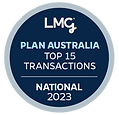
Fixed vs Variable Interest Rates: What’s the Difference and Which Is Better for You?
Choosing the right home loan is one of the most important steps when buying a property. Selecting the wrong loan structure can affect your long-term affordability, lifestyle, and financial stability. One of the biggest decisions you’ll face is whether to choose a fixed interest rate or a variable interest rate home loan. Both loan types have clear advantages and disadvantages, and the right choice depends on your goals, your lifestyle, and your personal risk tolerance. In some cases, you may even choose a split loan, combining the best of both worlds. Below, we break down the key differences to help you make an informed decision.
What Is a Variable Interest Rate? (Moves Up and Down)
A variable rate home loan has an interest rate that fluctuates over time. The rate is influenced by several factors, including:
-
Economic conditions
-
Inflation
-
Reserve Bank of Australia (RBA) cash rate decisions
-
Bank funding costs
When the RBA cuts rates, lenders often pass on these savings to borrowers—but not always.
Key Features of Variable Rates
✅ Flexibility in repayments
Most variable home loans allow unlimited extra repayments, enabling you to pay off your mortgage faster and save on interest.
✅ Access to useful features
Common features include:
-
Redraw facilities
-
Offset accounts
-
Ability to refinance without break costs
-
No fixed-term lock-ins
❗ Rates can rise
While you benefit when rates drop, you also take on the risk of higher repayments if the market shifts.
Who is Variable Rates Best for?
-
Borrowers comfortable with fluctuating repayments
-
Homeowners planning to make extra repayments
-
Investors wanting access to features like offset accounts
-
Anyone who values flexibility in their loan
What Is a Fixed Interest Rate? (Stays the Same)
A fixed-rate home loan locks in your interest rate for a set period—usually 1 to 5 years. During this time, your repayments stay exactly the same, regardless of what happens to interest rates in the wider market.
Most borrowers choose to fix their rate when they expect variable rates to rise.
Key Benefits to Fixed Rates
✅ Repayment certainty
Fixed repayments make budgeting predictable. This is helpful for families, first-home buyers, or investors wanting stable cash flow.
✅ Protection from rate rises
If interest rates increase, your loan stays protected at the locked-in rate.
Important Considerations for Fixed Rates
❗ Limited Extra Repayments: Many lenders cap how much extra you can repay (e.g. $5,000–$10,000 per year).
❗ Break Fees Apply: If you refinance, sell, or pay out your loan early during the fixed period, you may face break costs—which can be substantial.
❗ Reduced loan features: During a fixed term, features like:
-
Offset accounts
-
Unlimited redraw
-
Large lump-sum repayments
are often restricted.
Who Is a Fixed Rate Best For?
-
Borrowers wanting stability and predictable repayments
-
Homeowners expecting rates to rise
-
Those working to a strict budget
Who Is a Split Loan? ( Best of Both Worlds )
A split loan lets you divide your mortgage into two parts:
-
One portion at a fixed rate
-
The other at a variable rate
This gives you a balance of stability and flexibility.
Benefits of Split Loans?
-
Protection from interest-rate rises on the fixed portion
-
Ability to make extra repayments on the variable portion
-
Some access to features like offset accounts
-
Helps smooth out financial risk
Who Should Consider a Split Loan?
-
Borrowers unsure which option to commit to
-
Anyone wanting repayment stability and flexibility
-
Investors wanting partial access to offset or redraw features
How Do You Choose the Right Home Loan Rate?
There is no universal “right” answer—only what suits your financial situation. When deciding between fixed, variable, or split. Ask yourself:
-
Do I prefer certainty or flexibility?
-
Am I comfortable if rates rise?
-
Will I make extra repayments?
-
How important are features like offset or redraw?
-
Am I planning to refinance or sell soon?
Your choice should support your long-term goals—not just today’s interest rate environment.
Get Expert Guidance on the Right Home Loan Option
Every borrower’s situation is unique. If you’re unsure which loan structure suits your needs, speak with our mortgage experts today. We’ll help you compare your options, understand your borrowing power, and guide you toward the most cost-effective solution.

Need More Information?
Talk to Our Home Loan
Experts Today.

We're Here To Support You Through The Entire Home Buying Journey.
Make an Enquiry
Send us an enquiry or call 1300 103 998. Our team will get back to you within 30 minutes during business hours — and our service is completely free.
Get a pre-approval
We’ll review your situation, help you understand your borrowing power, and organise your home loan pre-approval. We’ll also check your eligibility for Australian Government first home buyer grants to help you get into the property market sooner.
House Hunt
Once you're pre-approved, you can confidently start house hunting. We can also introduce you to trusted conveyancers and buyers agents to help guide you through every stage of your home-buying journey.
Settlement
Once you sign the contract, our team will manage the loan settlement with the bank, ensuring a smooth transition to becoming a homeowner. Our service doesn’t stop here — we’ll check in with you every six months to make sure everything is going smoothly.
.png)







.png)
